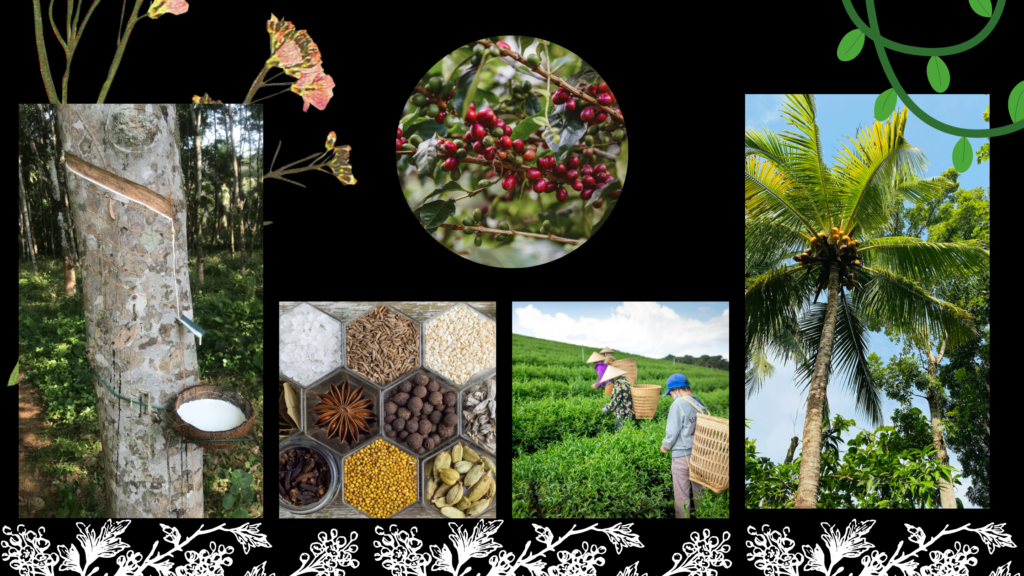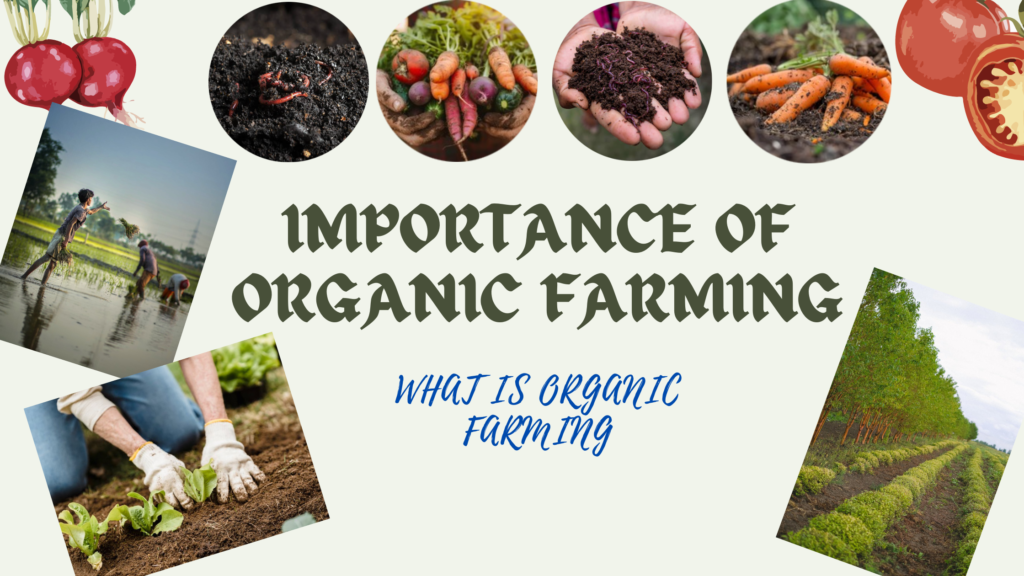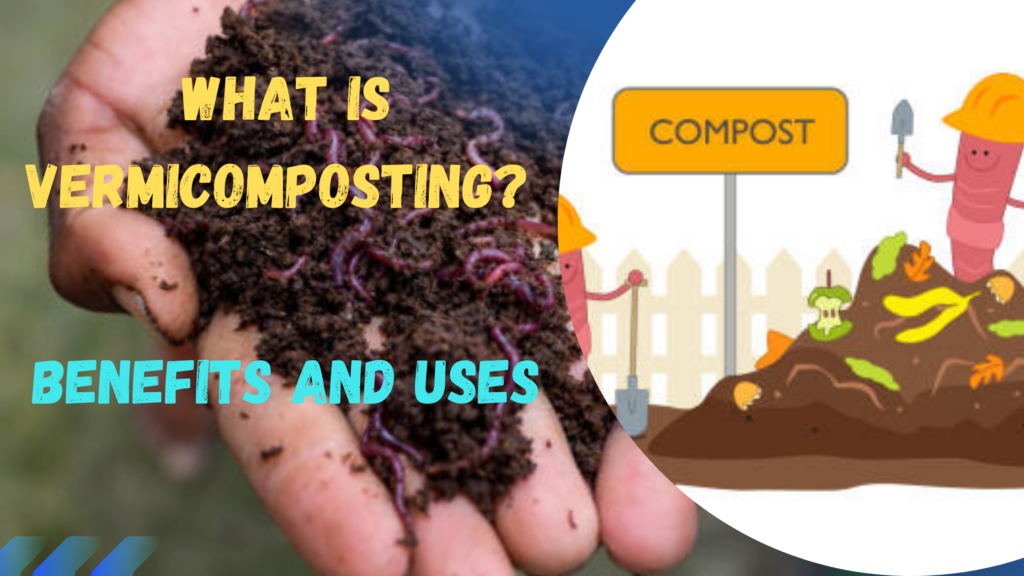Plantation crops in India
Plantation crops are an important part of Indian farming, grown mainly on large farms for commercial use. These crops, such as tea, coffee, rubber, coconut, and spices, require specific weather conditions and take time to grow.
In India, plantation crops not only provide jobs for millions of people but also contribute significantly to the country’s economy. Many regions, especially in the south and northeast, are famous for these crops, which are also exported around the world. Understanding plantation crops helps us appreciate their role in both local communities and the global market, as well as the need for sustainable farming practices to protect these vital resources.
What Are Plantation Crops?
Plantation crops are large-scale crops that are grown on big farms called plantations. They are mainly grown to be sold rather than for personal use. These crops usually need specific weather conditions and can take several years to grow.
Key Features:
- Large Scale: They are grown on large pieces of land.
- Specific Climate: They thrive in certain warm and tropical climates.
- Long Growing Time: Many take years to mature before they can be harvested.
- Labor-Intensive: Growing these crops requires a lot of work and people.
- Commercial Purpose: They are primarily meant for sale in markets.
Major Plantation Crops in India
India grows several important plantation crops, each with unique characteristics and uses. Here are some of the major ones:
1. Tea
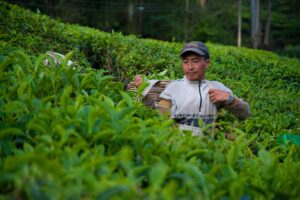
- Regions: Assam, West Bengal, Kerala
- Uses: Tea is one of India’s most famous exports, enjoyed globally as a beverage. The northeastern states, especially Assam, are renowned for producing some of the finest teas.
2. Coffee

- Regions: Karnataka, Kerala, Tamil Nadu
- Uses: India is a significant player in the global coffee market, with Arabica and Robusta being the primary varieties. The coffee estates in Karnataka attract both local and international buyers.
3. Rubber

- Regions: Kerala, Tamil Nadu, Karnataka
- Uses: Rubber is vital for the manufacturing industry, particularly in producing tyres and footwear. Kerala is the largest producer, contributing significantly to the state’s economy.
4. Coconut
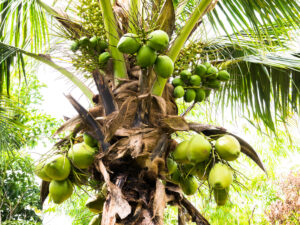
- Regions: Kerala, Tamil Nadu, Karnataka
- Uses: The coconut palm is known as the “Tree of Life” for its versatile uses, including coconut oil, coir products, and culinary applications. India ranks among the top producers globally.
5. Spices

- Regions: Kerala, Karnataka
- Examples: Cardamom and black pepper are two prominent spices. India is one of the largest producers and exporters of spices, which are integral to culinary traditions worldwide.
Economic Importance of Plantation Crops in India
Plantation crops are very important for India’s economy for several reasons:
- Job Creation: These crops provide millions of jobs, especially in rural areas. Many families depend on plantation farming for their income.
- Exports: India exports a significant amount of plantation crops like tea, coffee, rubber, and spices. This helps earn foreign currency and boosts the economy.
- Contribution to GDP: Plantation crops contribute to the country’s Gross Domestic Product (GDP), meaning they play a key role in the overall economic growth.
- Support for Local Industries: The processing and manufacturing of plantation products (like tea packaging or coffee roasting) create additional jobs and support local businesses.
- Rural Development: The income from plantation crops helps improve the living standards of farmers and their communities, leading to better education and healthcare.
Challenges Faced by the Plantation Sector
The plantation sector in India faces several challenges that can affect its growth and productivity. Here are some of the main issues:
- Climate Change: Changes in weather patterns, like unpredictable rainfall and rising temperatures, can harm crop yields and quality.
- Pests and Diseases: Plantation crops are often attacked by pests and diseases, which can reduce production and lead to financial losses for farmers.
- Market Fluctuations: Prices of plantation crops can vary widely due to demand and supply changes. This unpredictability makes it hard for farmers to plan and earn stable incomes.
- Soil Degradation: Continuous cultivation of the same crops can lead to soil exhaustion, reducing fertility and productivity over time.
- Lack of Modern Technology: Many farmers may not have access to the latest farming techniques or tools, which can limit their ability to improve yields and manage crops effectively.
- Labor Shortages: There can be a shortage of workers, especially during peak seasons, making it difficult to harvest crops on time.
- Water Scarcity: In some regions, water availability can be a challenge, affecting irrigation and crop health.
Sustainable Practices in Plantation Farming
Sustainable practices in plantation farming help protect the environment while ensuring that crops can be grown for many years. Here are some key practices:
- Organic Farming: This method avoids using chemical fertilizers and pesticides. Instead, it relies on natural compost and pest control to keep crops healthy.
- Crop Rotation: Farmers alternate different crops in the same area from season to season. This helps maintain soil fertility and reduces pest problems.
- Agroforestry: This practice combines planting crops with trees. The trees provide shade, help with soil health, and can also be a source of additional income.
- Water Conservation: Techniques like drip irrigation and rainwater harvesting are used to save water and ensure that crops receive the right amount without wasting resources.
- Soil Management: Using cover crops and compost helps improve soil health, preventing erosion and maintaining nutrients.
- Integrated Pest Management (IPM): This approach uses a combination of natural predators, resistant plant varieties, and other techniques to control pests instead of relying solely on chemicals.
- Community Involvement: Engaging local communities in farming practices helps share knowledge and resources, making farming more effective and sustainable.
